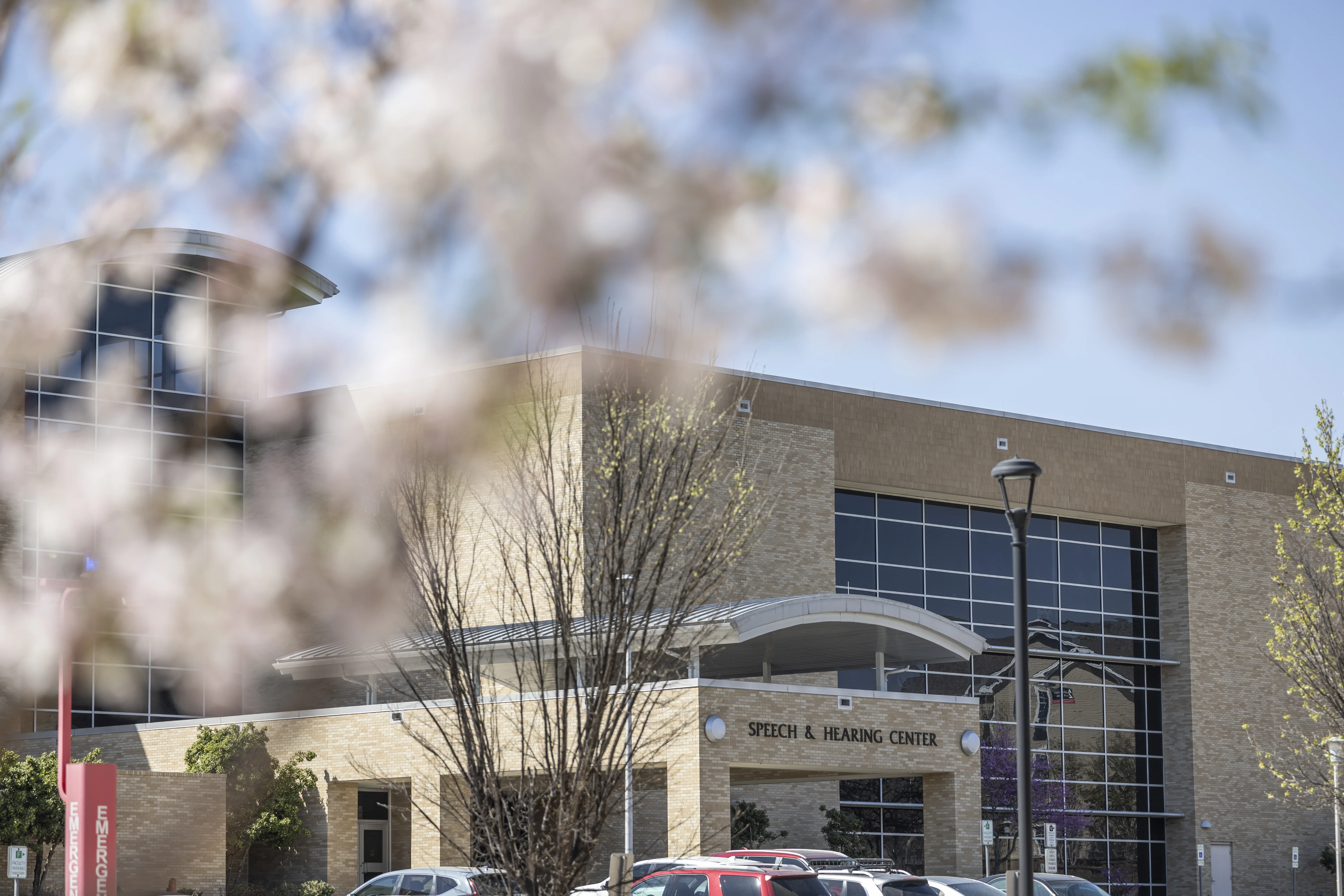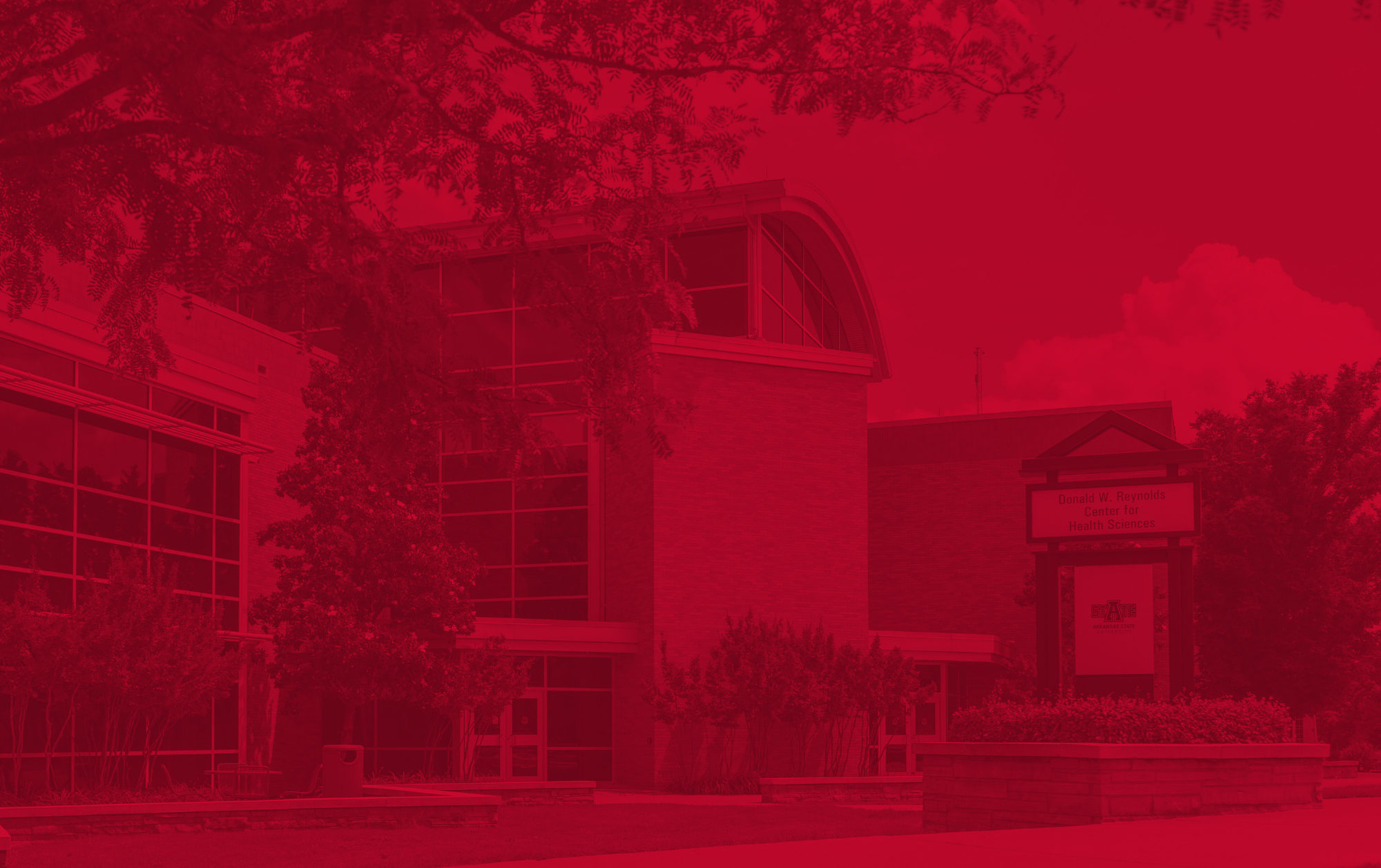MCD in Communication Disorders

Want a career helping others communicate? A-State’s Master's in Communication Disorders prepares you for licensure as a speech-language pathologist. With expert faculty, on-campus clinics, and real client interactions, you’ll graduate ready to lead in healthcare, education, or private practice.
Application Deadline
Next apply date
February 1, 2026Next start date
May 26, 2026
Degree Overview
Master's in Communication Disorders
The Master's in Communication Disorders is a graduate program designed to help you qualify for certification and state licensure as a speech-language pathologist. You’ll explore advanced classes in speech, language, voice, and swallowing disorders. You will also gain real clinical experience at our Speech and Hearing Center and in the community. Our program is built to meet the highest national standards, so you leave prepared.
College
Nursing & Health ProfessionsDegree Requirements
51 credit hours including clinical practice.
See all degree requirements for non-speech-language pathology undergraduates.
Admission Requirements
- Baccalaureate Degree with a 3.2 GPA or 3.2 over last 60 hours
- Completed Online Application
- Application Fee: $30
- Official Transcripts
- Meeting the minimum requirements for admission to the Graduate School does not necessarily equal acceptance into a particular graduate program.
Careers & outcomes
What can you do as a Master of Communication Disorders?
As the demand for speech-language pathologists continues to grow, A-State graduates are ready to meet it. You will build strong clinical, diagnostic, and therapeutic skills that open doors in schools, hospitals, rehab centers, and private practices. This degree will not only qualify you but also prepare you to lead the way in roles like:
- Speech Language Pathologist
- Pediatric Speech Therapist
- Speech Pathology Supervisor
- Director of Rehabilitation

The Honors College has given me so much opportunity. I designed my own research study that I presented at the National Council for Undergraduate Research. I received funding to attend and was able to present on a topic I’m passionate about... I really appreciate having what are typically graduate student experiences as an undergrad.
ACCREDITED BY CAA
(800) 498-2071 or (301) 296-5700
Connect With Us.
Program Requirements
Arkansas State University’s MCD program subscribes to the Centralized Application Service for Communication Science & Disorders Programs (CSDCAS). Applicants for admission to the A-State MCD program MUST apply online using the CSDCAS application. In addition, students who are accepted must also apply online to the A-State Graduate School. Transcripts must be sent to both CSDCAS and A-State’s Graduate School (see links below).
The deadline for submitting applications to CSDCAS is February 1st.
Applying to CSDCAS
To learn more about the CSDCAS application process and to get started, please go to the CSDCAS website. If you encounter difficulty with CSDCAS, please contact their Customer Service at 617-612-2030 or send an email to csdcasinfo@csdcas.org.
Once a student applies through CSDCAS, the transcript information is verified by CSDCAS. This process takes time and depends both on the efficiency of CSDCAS and the speed with which your schools respond to the inquiries from CSDCAS. A-State will accept completed, verified applications from CSDCAS until February 1st.
If CSDCAS has not completed the verification process by February 1st, the application will not be considered, even if it was submitted by the March 1st deadline. Therefore, applicants are strongly encouraged to submit their applications well before the deadline to ensure that the verification process will be completed by the deadline. All prerequisites must be completed at the time of graduation.
Rankings and Acceptance
After the February 1 deadline, the Communication Disorders (CD) Admissions and Credits Committee reviews all applications. Only those that meet the minimum requirements and GPA standards are considered. Applications that don’t meet these requirements are not reviewed further.
Qualified applicants are ranked using a point system. Points are awarded based on:
- Overall GPA
- GPA in the major
- Resume
- Video submission
- Letter of intent
- Recommendation letters
All points are added together to create a final score. Applicants are then ranked by score, and the program selects students based on how many spots are available.
Accepted applicants will receive an official email with their admission status. If invited, they must respond as soon as possible, but no later than April 15. If some students decline or drop out, the committee will invite others from the remaining pool of qualified applicants.
Program Start and Graduation
Students who are admitted begin the program in the first summer term after acceptance. If they successfully complete all coursework, practicum, and either a thesis or comprehensive exams, they will graduate 19 months later in December.
Questions?
If you have questions about applying, contact the Department of Communication Disorders at (870) 972-3106.
Application Review Process
The CD Admissions and Credits Committee reviews applications shortly after the February 1 deadline. To be considered, applicants must:
- Submit a complete application
- Meet Graduate Admissions requirements
Applicants Without a Speech-Language Pathology Degree
If your undergraduate degree is not in communication disorders, you can still apply. However, you must first complete at least 15 of the 38 required undergraduate credit hours listed by the CD program.
You must:
- Clearly state the year you’re applying for
- Provide written confirmation that you understand admission depends on completing all but one of the required courses
- Submit official proof (grade slips or transcript) showing you’ve met this requirement before the first day of classes
If you don’t provide this proof on time, your admission will be canceled. You may reapply for a future year.
Application Deadline
Applications are due February 1 each year. The program starts in the first summer term.
Applicants with undergraduate degrees in majors other than speech-language pathology may make application to the MCD program upon meeting the leveling requirements (listed below), which include 38 credit hours of core coursework.
Prior to Program Screening
The following courses must be completed prior to program screening and should be taken during the spring semester:
- CD 2653: Introduction to Communication Disorders
- CD 2203: Phonetics
- CD 2104: Anatomy & Physiology of Communication
- CD 3003: Speech and Hearing Science
- CD 3303: Normal Language Development
Program Screening
Upon completion of the above courses, post-degree students must complete Program Screening to qualify for continuation in the program.
- 3.25 or better Overall GPA
- A minimum of 30 hours of earned academic credit
- "C" or better in the following class:
• MATH 1023 College Algebra - "C" or better in the following classes:
• ENG 1003 Composition I
• ENG 1013 Composition II - 3.20 or better combined GPA for the following classes:
• BIO 2203 / 2201: Human Anatomy & Physiology Lecture & Lab, if taken• PSY 2013: Introduction to Psychology
Note: BIO 2203/BIO 2201 are only calculated if taken. If not taken, GPA will be calculated on remaining courses only.
• CHEM 1013 and 1011: General Chemistry and Lab
• CD 3033: Speech and Hearing Science
• CD 2104: Anatomy and Physiology of Communication
• CD 2203: Phonetics - Ten (10) clock-hours of documented, prescribed observation
- A speech & hearing screening (Free for CD Students)
Remaining Coursework
Upon successfully qualifying, the remaining coursework should be completed in the next fall/spring academic year.
Applicants must identify the specific year for which they are applying, and will be
considered for admission only after indicating in writing that they understand admission
for the targeted year is contingent on their provision of evidence (in the form of
an official transcript) of having successfully completed all of the screening and
core specified leveling requirements. Such evidence must be received prior to the
first day of classes for the targeted year, if admitted.
In the event documentation is not provided by that time, the admission decision will be considered null and void. The applicant may re-apply for admission for a subsequent year, however, admission is not guaranteed.
All equivalents/course substitutions must be approved by the CD Admissions and Credits Committee.
Note: the MCD program only admits in the summer term.
All candidates for the M.C.D. degree must take the appropriate PRAXIS II Examination required for licensure in Arkansas and for the Certificate of Clinical Competence (CCC). A copy of the scores must be sent to the Communication Disorders Program Director, College of Nursing and Health Professions, Arkansas State University, P.O. Box 910, State University, AR 72467-0910.
The Master of Communication Disorders (MCD) program is accredited by the Council on Academic Accreditation (CAA) in Audiology and Speech-Language Pathology, part of the American Speech-Language-Hearing Association (ASHA). This means the program meets high national standards and is regularly reviewed to maintain quality.
Praxis pass rates
| Year | # of Examinees | # Passed | Praxis Pass Rate |
|---|---|---|---|
| 2024-2025 | 28 | 26 | 93% |
| 2023-2024 | 30 | 29 | 96% |
| 2022-2023 | 27 | 25 | 94% |
| 3-Year Avg. | 94% |
Program completion rates
| Year | Completed Program within Expected Time Frame | Completed Program later than the Expected Time Frame | Not Completed | % Completed within Expected Time Frame |
|---|---|---|---|---|
| 2024-2025 | 27 | 1 | 0 | 96% |
| 2023-2024 | 30 | 0 | 0 | 100% |
| 2022-2023 | 27 | 1 | 0 | 96% |
| 3-Year Avg. | 97% |
UNCONDITIONAL ADMISSION STATUS
View University Graduate Degree Policies
The following Graduate School admission requirements are minimum standards which identify the pool of applicants from which departments select students to be admitted in a degree program. To be granted unconditional admission status in the Graduate School, applicants must:
- Submit a completed online application for admission and the nonrefundable application fee of $30 for U.S. Applicants, $40 for International Applicants, or $50 for Doctoral Applicants to Graduate School Admissions, along with the required program documents, by the deadline on the department website.
- Earned a baccalaureate degree from an accredited institution (or its equivalent as determined by the Graduate School).
- Achieved a minimum cumulative undergraduate grade point average of 2.75 on a 4.00 scale or a 3.00 GPA on the last 60 hours.
- Achieved a minimum 3.00 GPA on any previous graduate courses completed at either Arkansas State University or another accredited university.
- Submitted official transcripts from each college or university as requested by the Graduate School. Official transcripts must be submitted directly from the registrar of other institutions to the office of the Graduate School at Arkansas State University.
CONDITIONAL ADMISSION STATUS
An applicant who fails to meet the GPA requirements for Unconditional Admission Status, who lacks the appropriate undergraduate background for a particular degree program, or whose baccalaureate degree is from an unaccredited institution, may be granted conditional admission status after:
- Submission of a completed online application for admission and the designated nonrefundable application fee mentioned above to Graduate School Admissions, along with the required program documents, by the deadline on the department website.
- Submitted official transcripts from each college or university as requested by the Graduate School. Official transcripts must be submitted directly from the registrar of other institutions to the office of the Graduate School at Arkansas State University.
- Achieving a minimum cumulative undergraduate grade point average of 2.50 on a 4.00 scale or a 2.75 GPA on the last 60 hours for admission into a graduate program or for admission as a non-degree student.
PROGRAM ADMISSION CRITERIA
Meeting the minimum requirements for admission to the Graduate School does not necessarily ensure acceptance into a particular graduate degree program. Individual departments may establish requirements for individual degree programs above and beyond the standards for admission to the Graduate School.
1. SUBMISSION OF APPLICATION MATERIALS
Closely observe the deadline and required materials set by your graduate program of interest, including any additional documents requested of students who are seeking departmental funding through assistantships or fellowships. Complete the application and fax, e-mail or mail any materials that could not be submitted online to A-State Graduate Admissions.
General documents needed in the application process:
- A completed online application accompanied by the appropriate application fee ($30 for U.S. applicants, $50 for International applicants, $50 for Doctoral applicants), along with the required documents for that specific graduate program. See the program website for specific required documents. (There may be separate application forms for some programs, as noted on the departments' websites.)
- Official transcripts from all colleges and universities attended since leaving high school. Transcripts must be mailed directly from the institutions previously attended. If you are a graduate of A-State, we will obtain your transcript for you.
- All students are required to present written documentation of measles, mumps, and rubella (MMR) immunization. This immunization must have been received after the first birthday and after January 1, 1968.
- Arkansas law requires that, in order to be eligible for enrollment at a public institution of higher learning, a male applicant between the ages of 18 and 25 who is a U.S. citizen must be registered or be exempt from registration with the Selective Service System.
- If a standardized test is required for your major, you may contact the Testing Center at Arkansas State University at (870) 972-2038 for information regarding tests and test dates.
2. REVIEW BY THE ACADEMIC PROGRAM
Once an applicant has submitted all required documents to Graduate Admissions, the admissions committee for that particular academic program will review their applicant file and make their decisions regarding admission.
3. FINAL REVIEW BY THE GRADUATE SCHOOL
Once the Graduate School receives the academic program’s admission decision, they email a copy of that Notice of Admission Decision to the applicant, unless the program notifies their applicants directly.
4. ADMISSION
If accepted into the degree program to which you applied, Graduate Admissions will admit you to the University and email you a copy of your Notice of Admission, unless that program notifies their accepted applicants directly. Admitted applicants need to check with their assigned advisor, as noted on their Notice of Admission, in order to be able to register for the semester.
Background Checks
Based on Arkansas law, students will be required to complete a background check AFTER they receive conditional admission into the program.
Arkansas State University’s College of Nursing and Health Professions works with Verified Credentials, Inc. to establish an acceptable screening procedure. The cost of the background check is between $50 and $100.
Background Checks for Students Newly Admitted into the MCD Program
Once you are accepted and have decided to attend graduate school at Arkansas State University, information will be shared with you so you can complete the background check.


